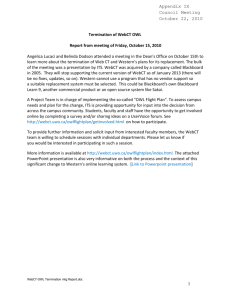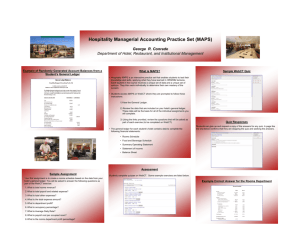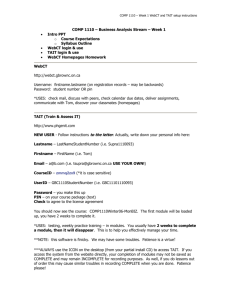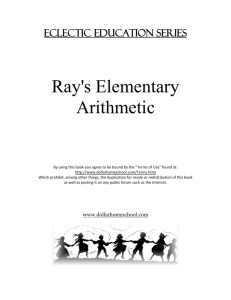Evelyn Sterne Department of History, University of Rhode Island HIS
advertisement
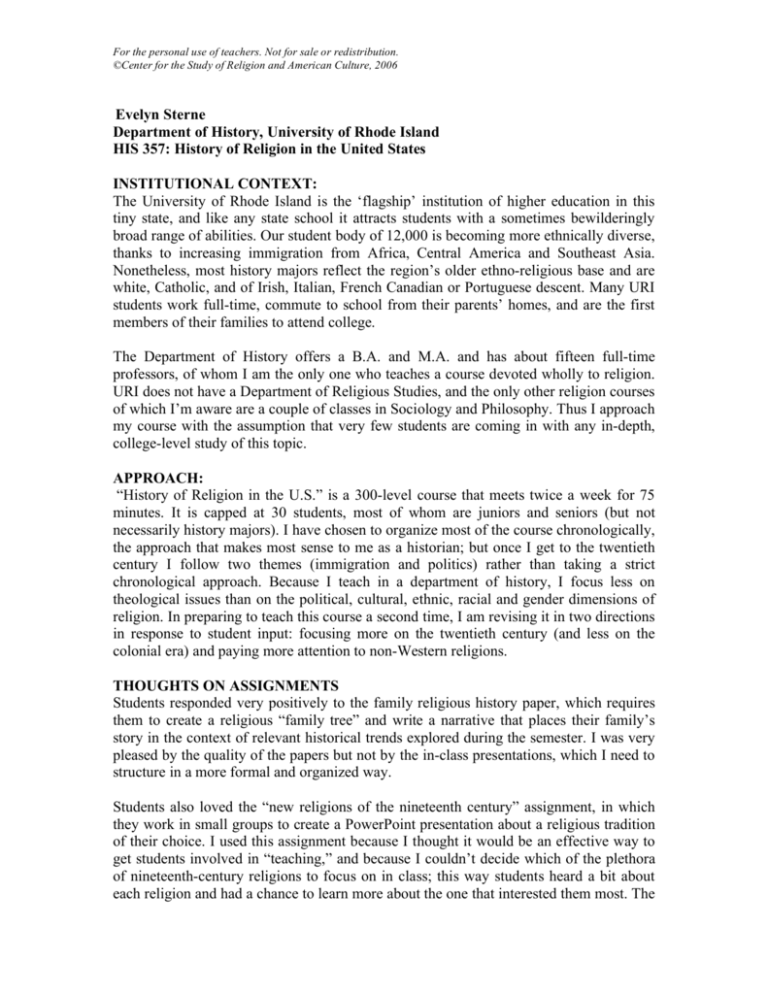
For the personal use of teachers. Not for sale or redistribution. ©Center for the Study of Religion and American Culture, 2006 Evelyn Sterne Department of History, University of Rhode Island HIS 357: History of Religion in the United States INSTITUTIONAL CONTEXT: The University of Rhode Island is the ‘flagship’ institution of higher education in this tiny state, and like any state school it attracts students with a sometimes bewilderingly broad range of abilities. Our student body of 12,000 is becoming more ethnically diverse, thanks to increasing immigration from Africa, Central America and Southeast Asia. Nonetheless, most history majors reflect the region’s older ethno-religious base and are white, Catholic, and of Irish, Italian, French Canadian or Portuguese descent. Many URI students work full-time, commute to school from their parents’ homes, and are the first members of their families to attend college. The Department of History offers a B.A. and M.A. and has about fifteen full-time professors, of whom I am the only one who teaches a course devoted wholly to religion. URI does not have a Department of Religious Studies, and the only other religion courses of which I’m aware are a couple of classes in Sociology and Philosophy. Thus I approach my course with the assumption that very few students are coming in with any in-depth, college-level study of this topic. APPROACH: “History of Religion in the U.S.” is a 300-level course that meets twice a week for 75 minutes. It is capped at 30 students, most of whom are juniors and seniors (but not necessarily history majors). I have chosen to organize most of the course chronologically, the approach that makes most sense to me as a historian; but once I get to the twentieth century I follow two themes (immigration and politics) rather than taking a strict chronological approach. Because I teach in a department of history, I focus less on theological issues than on the political, cultural, ethnic, racial and gender dimensions of religion. In preparing to teach this course a second time, I am revising it in two directions in response to student input: focusing more on the twentieth century (and less on the colonial era) and paying more attention to non-Western religions. THOUGHTS ON ASSIGNMENTS Students responded very positively to the family religious history paper, which requires them to create a religious “family tree” and write a narrative that places their family’s story in the context of relevant historical trends explored during the semester. I was very pleased by the quality of the papers but not by the in-class presentations, which I need to structure in a more formal and organized way. Students also loved the “new religions of the nineteenth century” assignment, in which they work in small groups to create a PowerPoint presentation about a religious tradition of their choice. I used this assignment because I thought it would be an effective way to get students involved in “teaching,” and because I couldn’t decide which of the plethora of nineteenth-century religions to focus on in class; this way students heard a bit about each religion and had a chance to learn more about the one that interested them most. The For the personal use of teachers. Not for sale or redistribution. ©Center for the Study of Religion and American Culture, 2006 quality of the presentations was wildly uneven, however, and I was not at all confident that students walked away with a clear understanding of the various traditions. Next time I plan to be better prepared myself, require each group to supplement its presentation with a handout, and designate notetakers for each presentation. Students generally liked writing the reaction papers (two-page papers on some aspect of that week’s readings, due every other week). I usually assign these in 300-level classes and find they really do make for more stimulating discussions by requiring students to think about the reading before coming to class. Next time I may alternate between giving students questions to answer and asking them to come up with a question and answer it (in which case their grade would reflect the quality of the question as well as the answer). In this class and others, most students complain about taking a quiz every other week. I like quizzes because they require students to keep up with the reading, give them a chance to see what kind of tests I give before taking a midterm, and help me to see which material they did not understand. Nonetheless, I’m considering replacing the quizzes with additional papers or other assignments. I use simple WebCT sites for all my classes in order to make handouts available to students who lose them or miss classes. This makes my life easier. I have not yet used WebCT for online discussions. THOUGHTS ON READINGS: I do not use a survey text because I have not found one that’s a good fit with the themes and structure I want to use, and because there are so many lively, stimulating monographs to choose from. I struggle with this, however, as I feel my students would benefit from a general overview. My students do not particularly like Major Problems in American Religious History (a collection of short essays and primary sources organized around various themes), which we use throughout the semester, but I continue to assign it because the short readings present multiple perspectives and provide so many valuable projects for group work. In response to student interest, I have replaced my colonial era monograph (Richard Godbeer’s The Devil’s Dominion) with a book on recent immigrant religions (Anne Fadiman’s The Spirit Catches You and You Fall Down). Now the readings on Puritans are too thin, however, and I’m working on supplementing them with a few essays and primary sources. Students generally liked Paul Johnson and Sean Wilentz’s The Kingdom of Matthias and loved Robert Orsi’s The Madonna of 115th Street (which resonates on a very personal level for many of them). I love Randall Balmer’s Mine Eyes Have Seen the Glory but found the pitfall to its case-study approach is that it’s easy for students to read just a few chapters and be able to ‘prove’ they read the book. I’m considering replacing it with Dennis Covington’s Snakes Alive but have not yet done so as I think Mine Eyes is a wonderful read and can be such an effective teaching tool. For the personal use of teachers. Not for sale or redistribution. ©Center for the Study of Religion and American Culture, 2006 History 357: History of Religion in the United States Fall 2006 TR 11-12:15, Washburn 308 Professor: Office Hours: Office: Mailbox: Contact at: Dr. Evelyn Sterne TR 2-4, or Mondays by appointment Washburn 217B 113 Washburn (in History Department office on first floor of Washburn) 874-4074 or sterne@uri.edu COURSE DESCRIPTION This course will explore the history of religion in the United States from the colonial period to the present, with emphasis on the nineteenth and twentieth centuries. Our focus will be less on theological issues than on the political, cultural, ethnic, racial and gender dimensions of religion. Major themes will include: the diversity of religious traditions in this nation; the intersections between religion and politics; and the ways in which religion has shaped and been shaped by national, ethnic and racial identities. Throughout the course, we will bring together past and present by discussing how the study of religious history informs our understanding of current issues and debates. COURSE GOALS This course sets three goals. The first has to do with knowledge: develop a firm grasp of major trends and issues in American religious history from the colonial period to the present. The second has to do with application: draw connections between various lessons and use your study of the past to better understand the present. The third has to do with skills: improve your writing; become comfortable speaking in front of a group; and learn to think creatively. COURSE PHILOSOPHY This course operates on two premises: history is one part fact and many parts interpretation; and learning history is one part listening and many parts discussion. I encourage you to interpret history in your own way and to participate in class as frequently and creatively as you like. COURSE STRUCTURE Each class will combine lecture with discussion and participatory activities such as analyzing primary sources, breaking into groups to discuss questions, or completing short writing assignments. There will be a strong emphasis on student involvement. PLAGIARISM AND CHEATING Plagiarism or cheating is sufficient grounds for failure of the course and may result in additional disciplinary action. Please refer to the URI Manual (Chapter 8: Academic Regulations, Sections 8.27.10-8.27.20) and the URI Student Handbook (Community Standards of Behavior: University Policies and Regulations) for more information. For the personal use of teachers. Not for sale or redistribution. ©Center for the Study of Religion and American Culture, 2006 REQUIREMENTS Class Participation: Biweekly Quizzes (five quizzes, lowest score dropped): Biweekly Reaction Papers (five two-page papers): Group PowerPoint Presentation (Oct. 12 or 17): Midterm Examination (Oct. 24): Family History Project (seven pages -- due Dec. 7): Final Examination: 10 percent 10 percent 10 percent 10 percent 20 percent 20 percent 20 percent Attendance You are adults and I will not penalize you for missed classes; thus it is not necessary to explain your absences to me. Please realize, however, that every time you skip class you miss material that will be on tests and opportunities to earn points toward your class participation grade. If you miss a class, it is your responsibility to get a copy of the notes from a classmate and find out whether you missed any important announcements. Class Participation Your class participation grade will be determined by active and informed participation in discussions, group projects, and in-class writing exercises. You should take ownership of your education by participating actively in your classes; this is your opportunity to ask questions, express concerns, and share opinions. Your participation will make class more interesting for both you and your classmates. Examinations Each exam will combine short answers with essays. I will give make-up examinations only to students who can produce proof of a medical problem, family emergency, religious holy day, or required university commitment (all requiring notes). Family History Paper Your final project will be a seven-page paper that places your family’s religious history in the context of broader historical trends, through a combination of oral history, family memories and secondary sources. Detailed instructions will be posted on WebCT. This assignment is your opportunity to learn more about your own past, think about how it connects to the nation’s history, and explore in detail a religious tradition we might not have focused on in class. Quizzes Every other week, you will take a quiz that covers material from the previous two week’s readings and classes. There will be a total of five quizzes. I will not give make-up quizzes under any circumstances, but I will allow you to drop your lowest grade. The quizzes motivate you to keep up with the reading and help you to see which material you missed or misunderstood, before having to discuss it on a midterm or final examination. Your performance on quizzes helps me to see which concepts I did not explain clearly and need to review with you. For the personal use of teachers. Not for sale or redistribution. ©Center for the Study of Religion and American Culture, 2006 PowerPoint Presentation On October 12 or 17 you will (in groups of three) make a ten-minute PowerPoint presentation about a new religion of the 19th century. Detailed instructions will be posted on WebCT. These presentations will enable you to learn more about a religious tradition that interests you, use classroom technology, and be the teacher instead of the student. Reaction Papers On weeks that you do not take a quiz, you will turn in a two-page reaction paper on the reading (for a total of five papers). I will post the topics on WebCT. The purpose of these papers is for you to gather your thoughts on the reading and come to class better prepared to discuss it. These are informal papers that will be graded on a check plus/check/check minus basis. I do not accept papers by email. Reading You will read these books, available at the URI Bookstore and RI Book Company. • Patrick Allitt, Major Problems in American Religious History • Randall Balmer, Mine Eyes Have Seen the Glory: A Journey Into the Evangelical Subculture in America (3rd ed.) • Anne Fadiman, The Spirit Catches You and You Fall Down: A Hmong Child, Her American Doctors, and the Collision of Two Cultures • Paul E. Johnson and Sean Wilentz, The Kingdom of Matthias: A Story of Sex and Salvation in 19th-Century America • Robert A. Orsi, The Madonna of 115th Street: Faith and Community in Italian Harlem SKILLS AND SPECIAL NEEDS If you have documented special needs that entitle you to services such as note-taking and untimed tests, please notify me as soon as possible so I can make the appropriate accommodations. I will need a note from Disability Services (330 Memorial Union, 8742098) in order to do so. Students who do not fit this profile but would like help with academic skills should contact the Academic Enhancement Center located on the fourth floor of Roosevelt Hall (874-2367, www.uri.edu\aec). WEBCT This course has a simple WebCT site that will post class handouts and assignments. I will register all students for the site, which can be accessed through the “Libraries and Technology” link on the URI home page. WRITING CENTER I strongly encourage you to take your papers to the University Writing Center. Going to the center won’t provide a quick fix, turning a “C” paper into an “A” paper, but if you make a habit of going your writing will improve gradually. If you need assistance with a paper, it would be wise to call to schedule your appointment a week or two before the paper is due (especially near the end of semester when the center will be particularly busy). The Writing Center is part of the Academic Enhancement Center, located on the fourth floor of Roosevelt Hall (874-2367, www.uri.edu\aec). For the personal use of teachers. Not for sale or redistribution. ©Center for the Study of Religion and American Culture, 2006 UNIT 1: RELIGION IN THE COLONIAL ERA Sept. 7: INTRODUCTION Sept. 12: NATIVE AMERICAN RELIGIONS Reading: Major Problems, 25-27, 30-34, 38-57 • “Castillo Describes Cortes’ Replacement of Human Sacrifice with the Cult of the Virgin Mary” • “Jouvency Discusses Death and Hell with Canadian Indians” • “Williams Explains Rhode Island Indians’ Language and Religion” • “The Delaware Indians’ View of Bear Spirits” • “Muir Witnesses the Conversion of Thlinkit” • Albanese, “American Indians’ Nature Religion” • Ronda, “Indians’ Views of Christian Missionaries” Sept. 14: THE PURITANS Reading: Major Problems, 61-65, 75-83 • “Winthrop Outlines His Plan” • “Bradford Sees God’s Mercy and Judgment” • “Why Harvard College Was Founded” • Miller, “The Puritans’ Errand Into the Wilderness” *Reaction Paper* Sept. 19: ALTERNATIVES AND CHALLENGES Reading: Anne Hutchinson trial transcript excerpt (on WebCT) Salem Witch Trial transcript excerpt (on WebCT) Kingdom of Matthias, 3-47 Major Problems, 72-75 • “Mather Advises Richards on Detecting Witches” Sept. 21: THE FIRST GREAT AWAKENING Reading: Kingdom of Matthias, 49-90 Major Problems, 92-100, 111-17 • “Edwards Describes the Great Awakening” • “Cole Hears the Preaching of Whitefield” • “Wheatley’s Elegy at Whitefield’s Death” • Bunomi, “The Great Awakening” *Quiz* For the personal use of teachers. Not for sale or redistribution. ©Center for the Study of Religion and American Culture, 2006 Sept. 26: RELIGION AND REVOLUTION Reading: Kingdom of Matthias, 91-125 Major Problems, 102-10 • “Witherspoon Preaches the War as God’s Test” • “Boucher’s Loyalist Sermon” • “Benezet Denounces War” • “Jackson Protests Persecution” • “Jefferson Establishes Religious Freedom” UNIT 2: RELIGIOUS DIVERSITY IN THE 19TH CENTURY Sept. 28: THE SECOND GREAT AWAKENING Reading: Kingdom of Matthias, 127-179 Major Problems, 129-34, 145-51 • “Brownson Recalls His Quest” • “Finney Stirs Up Religious Emotions” • Hatch, “Christianity and Democratic Politics” *Reaction Paper* Oct. 3: RELIGION AND SLAVERY Reading: Madonna of 115th Street, xiii-13 Major Problems, 138-44, 152-59 • “Ex-Slave Sees Ghost” • “Bibb Uses Conjuring” • “Ringgold Escapes from Slavery” • Raboteau, “The Slaves’ Own Religion” Oct. 5: ANTI-CATHOLICISM Reading: Madonna of 115th Street, 14-49 Major Problems, 162-71, 183-88 • “De Tocqueville Sees Democracy and Catholicism” • “Monk Shocks Protestant Readers” • “Maguire Recounts the Suffering of Irish Catholics” • Dolan, “Catholic Charity and Protestant Suspicions” *Quiz* For the personal use of teachers. Not for sale or redistribution. ©Center for the Study of Religion and American Culture, 2006 Oct. 10: STUDENT PRESENTATIONS: NEW RELIGIONS OF THE 19TH CENTURY Reading: Madonna of 115th Street, 50-106 Major Problems, 127-29, 134-37 • “Wight Meets Ann Lee” • “Smith Explains How an Angel Guided Him” Oct. 12: STUDENT PRESENTATIONS: NEW RELIGIONS OF THE 19TH CENTURY Reading: Madonna of 115th Street, 107-62 Major Problems, 209-13, 232-39 • “Russell Argues ‘End Times’ Are Imminent” • “Dyer Remembers Wovoka” • “Eddy, the Founder of Christian Science” • “Vivekananda Describes His Life” • “Tucker Describes the Salvation Army” *Reaction Paper* Oct. 17: REVIEW SESSION Reading: Madonna of 115th Street, 163-231 Review readings and notes and prepare questions. Oct. 19: **MIDTERM EXAMINATION** UNIT 3: IMMIGRATION, RACE AND RELIGION Oct. 24: THE “NEW” IMMIGRANTS: CATHOLICISM Reading: The Spirit Catches You, vi-105 Oct. 26: THE “NEW” IMMIGRANTS: JUDAISM Reading: The Spirit Catches You, 106-53 Major Problems, 172-74, 239-44, 293-96, 302-08, 317-21, 352-56 • “Roth Warns His Emigrant Son” • “Cahan Shows How American Business Life” • “Yezierska Confronts an Orthodox Jewish Father” • “Sonderling Observes American Jewish Life” • Joselit, “Jewish Food and Jewish Identity” • Silk, “The Idea of a Judeo-Christian Tradition” *Quiz* For the personal use of teachers. Not for sale or redistribution. ©Center for the Study of Religion and American Culture, 2006 Oct. 31: RECENT IMMIGRANTS AND THEIR RELIGIONS Reading: The Spirit Catches You, 154-224 Major Problems, 431-47, 452-57 • “Munzy Attends Vietnamese Funerals” • “Muslims’ Mixed Feelings About American Culture” • “Pressures on Muslim Teenagers” • “Hindus’ Adjustments to American Life” • Voll, “Muslim Adaptation in America” Nov. 2: RECENT IMMIGRANTS: RELIGION VS. MEDICINE Reading: The Spirit Catches You, 225-88 *Reaction Paper* UNIT 4: RELIGION AND POLITICS IN MODERN AMERICA Nov. 8: RELIGION AND CIVIL RIGHTS Reading: Mine Eyes Have Seen the Glory, xv-47 Major Problems, 360-65, 367-69, 379-92 • “King Preaches on the Power of Love” • “Baldwin Becomes a Boy Preacher” • “Christianity Today Criticizes Black Americans” • Garrow, “Martin Luther King, Jr.’s Leadership” • McGreevy, “Urban Catholics and the Civil Rights Movement” **TUESDAY CLASSES MEET WEDNESDAY THIS WEEK** Nov. 9: RELIGION AND THE COUNTERCULTURE Reading: Mine Eyes Have Seen the Glory, 48-91 Major Problems, 394-97, 400-26 • “The Appeal of Eastern Religions” • “Why Hippies Join the Hare Krishnas” • “The People’s Temple” • “Starhawk Advocates Witchcraft” • “Goddess Worship” • “Flaherty Sympathizes with Planet Earth” • Mann, “Social Psychology of the Rajneesh Cult” • Melton, “Rise and Fall of the New Age Movement” *Quiz* For the personal use of teachers. Not for sale or redistribution. ©Center for the Study of Religion and American Culture, 2006 Nov. 14: ORIGINS OF FUNDAMENTALISM Reading: Mine Eyes Have Seen the Glory, 92-146 Major Problems, 259-63, 266-69 • “Hodge Denounces Darwin” • “Christianity and Evolutionary Theory Compatible” • “Gladden Explains Higher Criticism” • “Bryan Defends Biblical Infallibility” Are Nov. 16: REBIRTH OF EVANGELICALISM Reading: Mine Eyes Have Seen the Glory, 147-208 Major Problems, 398-400, 465-68, 495-502 • “Lindsey Foresees the Millenial ‘Rapture’” • “Graham Urges a Troubled Nation to Turn to God” • Ammerman, “Fundamentalism and Politics” *Reaction Paper* Nov. 21: RELIGION AND POLITICS Reading: Mine Eyes Have Seen the Glory, 209-57 Major Problems, 376-78, 472-77, 479-86 • “Bell Joins an Anti-Abortion Demonstration” • “Voting Biblically” • “Gilkey Opposes Creation Science” • “Political Contamination of Religion” • “McConnell Fears for Religious Freedom” Nov. 23: **NO CLASS – HAPPY THANKSGIVING!** Nov. 28: RELIGION IN PUBLIC SCHOOLS Reading: Mine Eyes Have Seen the Glory, 258-319 “State of Rhode Island Senate Resolution” (on WebCT) “URI Faculty Senate Meeting Minutes” (on WebCT) Major Problems, 471-72, 477-79 • “Decision Against School Prayer” • “Restore Religion in Schools” *Quiz* Nov. 30: STUDENT PRESENTATIONS: RELIGION AND FAMILY HISTORY Reading: None. Work on family history paper. For the personal use of teachers. Not for sale or redistribution. ©Center for the Study of Religion and American Culture, 2006 Dec. 5: STUDENT PRESENTATIONS: RELIGION AND FAMILY HISTORY Reading: None. Work on family history paper. **Family History Paper Due** Dec. 7: CONCLUSIONS / REVIEW SESSION Reading: None. Prepare questions for review session. DATE? **FINAL EXAMINATION**
